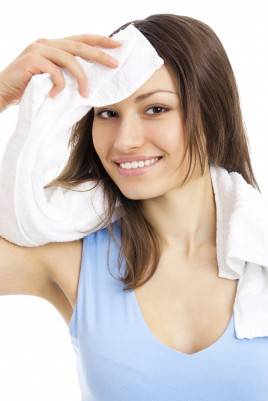A question that many young women are asking is whether wearing makeup actually makes their blemishes (pimples, whiteheads and blackheads), worse.
It is a tricky situation, especially as many are using makeup to conceal or disguise those blemishes in the first place.
The answer is, yes and no!
Firstly, there are some products that can make breakouts worse, so if you have experienced a worsening of your skin problems since starting to use a new product, it would be worth stopping for at least a week to see if matters improve. A good tip when you buy any new makeup or skin care product is to just dab a little behind one ear, or in the crook of your elbow and leave it on overnight. If there is no sign of irritation in the morning, you are probably safe to try using it on your face.
Look for Non-comedogenic Products
Non comedogenic products are the ones to look for if you have problems with acne as this term means that the makeup will not block your skin pores. Also, check the packaging of any skin care or cosmetic product for the words fragrance free and/or hypoallergenic as these terms give reassurance that the product is unlikely to irritate your skin.If you were to single out one ingredient to avoid in skin products that is the most likely culprit for causing blemishes, it would be lanolin which, although it is a natural product derived from the wool of sheep, is often responsible for allergic reactions.
One type of acne is actually called “acne cosmetica” and although this name would seem to imply that it is caused by cosmetics, it can be caused by any product you use on your skin, soap, body wash, lotions, cleansers, moisturizers, makeup, etc. Even if you have never had acne in your life before, a product can trigger this type of acne. Obviously this is more common on the face and is actually more of a rash than the usual acne blemishes and generally does not lead to scarring.
If you exercise regularly, either jogging, playing sports or going to the gym and working up a sweat, remove your makeup beforehand. Sweat will mix with makeup causing pores to get blocked and lead to problems. By cleansing your skin before you exercise and cleansing again afterwards to remove all traces of sweat before reapplying cosmetics will avoid potential problems.Moisturizers can cause Milia (whiteheads) and this is especially true around the eye area where using a thick and creamy product that is too rich for the skin can result in the development of these little white spots which can be tricky to remove and can start to spread. Always use an eye care product specifically designed for that area and do not overload your skin with too much product – usually a tiny spot is all that is needed.
Shiny lipsticks and lip glosses can also cause problems with whiteheads and pimples around the lip line. This is because of the substances they contain to make them shiny and which block the pores and lead to spots. Matte lipsticks are less likely do this.
Hair products should be used with care too. Don’t spray so that product falls onto the skin of your face – hold a clean tissue pressed against your skin with the palm of one hand whilst you apply spray with the other. Try and avoid leaving a residue of any products used on the hair, on your hairline as this can leach into your skin and cause problems too. In the same way as we suggested removing makeup before exercise, it is a good idea to exercise without hair products on your hair – save these for afterwards as if you perspire, these would otherwise get carried down onto your skin.
By taking care when you buy a new makeup product and testing it on a tiny area before you start using it and by checking ingredient labels carefully to avoid the most common triggers for allergic reactions, you should find you can wear cosmetics without problems. However, if your skin is hypersensitive, your quest for products you can safely use may be a little more tricky but don’t give up as there are many Dermatologist-recommended products on the market and a Dermatologist or Cosmetologist should be able to advise you on these.
Alison Graham on Google+


